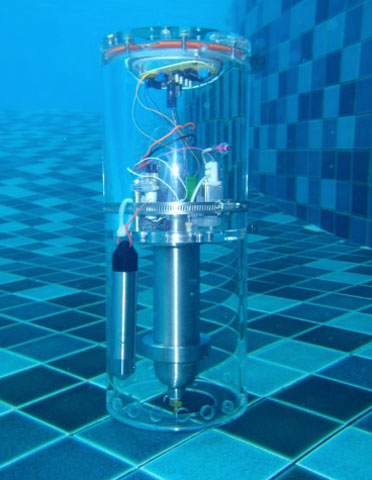The U.S. Naval Research Laboratory has developed the Zero Power Ballast Control technology, an autonomous zero-power bathythermograph sensor system.
 The current device is composed of two chambers: the top, "dry" chamber containing the electronics, valves, solenoids, and timers; and the lower chamber, that contains the growth chamber (center tube) that becomes pressurized while bacteria are growing.Image Credit: U.S. Navy Reserve/Tom Boyd
The current device is composed of two chambers: the top, "dry" chamber containing the electronics, valves, solenoids, and timers; and the lower chamber, that contains the growth chamber (center tube) that becomes pressurized while bacteria are growing.Image Credit: U.S. Navy Reserve/Tom Boyd
The ZPBC technology uses microbial energy harvesting to allow unsupervised underwater sensing with surfacing and reporting capabilities. The goal of the technology will be a simple, small, power-efficient data harvesting nodes with subsequent surfacing and reporting capabilities that will not need a separate fuel source to move in water.
The device will be able to monitor ocean temperatures with a stay time ranging from weeks to months and eventually years. This is much longer than the other mechanisms such as the Expendable Bathythermograph which are currently being used to monitor ocean related data.
Dr. Justin Biffinger found the preliminary trials very successful. He said that the device surfaced and submerged periodically as designed via hydrogen gas produced from the microbial inoculum and growth medium, proving the device generated gas in sufficient quantity to produce buoyancy.
A sensor of this kind could be useful for a wide range of military and civilian ocean monitoring experiments. The Navy said that it could be used in multiple ways from mine detection to meteorology and oceanography.